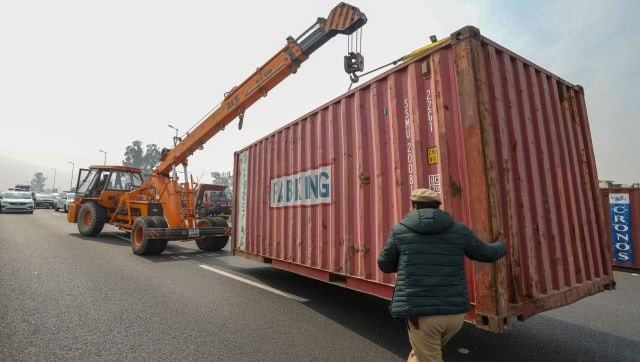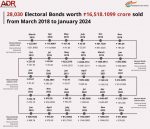A worker lays down barbed wire on National Highway 44 in view of farmers’ ‘Delhi Chalo March’, near Singhu border in Sonipat district. PTI
All roads lead to Delhi. At least that’s the case for the farmers. As many as 200 farmers’ unions are gearing up for a massive ‘Delhi Chalo’ campaign on 13 February, which is headed to… the Capital. Farmers atop tractors and trolleys are making their way towards Delhi from neighbouring Punjab, and Haryana and Uttar Pradesh, demanding that the government give into their demands.Anticipating a security hazard, the Delhi Police has clamped prohibitory orders (Section 144) for a month, beginning today. In fact, Delhi Police Commissioner Sanjay Arora has stated that there is “an absolute prohibition” on the organisation, convening, or participation in any processions, demonstrations, rallies, or march on foot, whether for political, social, or any other purpose, within the geographical limits of Delhi/New Delhi.”As the borders at Delhi are fortified and orders are imposed, let’s take a closer look at what’s allowed, what’s not.Related Articles Spanish farmers blocked major highways for second day against EU policiesMSP for produce of ‘Annadata’ periodically increased, says Sitharaman in Budget speechProhibitory orders imposed in DelhiOn Monday, the Delhi Police imposed Section 144 in the Capital region for a month — until 12 March — in view of intended widespread tension and “social unrest” due to the farmers’ ‘Delhi Chalo March’ on Tuesday.The order read: “There is an imminent risk of widespread tension, public nuisance, public annoyance, social unrest and the potential for violence on account of the participants of the march entering into the territory of New Delhi.“Therefore, to ensure public safety, tranquility and public order in Delhi, it has become imperative to take all required precautionary steps to keep a check on the activities of the participants of the above-mentioned march for which no permission has been granted.”A shipping container being placed to block National Highway 44 in view of farmers’ ‘Delhi Chalo March’, near Singhu border in Sonipat district. A large number of farmers from Uttar Pradesh, Haryana and Punjab are expected to march towards the national capital on Tuesday. PTIAs per the orders, no rally or procession shall be permitted within the city and neither will blocking of roads or passages be allowed. Moreover, the Delhi Police order has imposed a ban on tractor rallies trying to cross the borders of the national capital.The order further reads that there shall be a prohibition on assembly of people, blocking of roads, any type of procession agitation, rally, public meeting by agitators. The authorities in the Capital have also barred people from collecting or carrying any form or explosives, boulders, acid, petrol, soda water bottles or any item that can be used to cause danger to anyone.The order has also stipulated for strict checks of vehicles moving between Haryana, Uttar Pradesh and Delhi. It also says the dissemination of any provocative slogan or message through verbal, written or electronic means will be considered unlawful.In addition to this, the use of any amplifier or loudspeaker on any private vehicle or building or a public area is prohibited unless specifically allowed.An NDTV report further stated that weddings and funeral processions, along with religious rallies will only be permitted if permission has been sought from the concerned authorities.The authorities have stated that failure to comply with their order will attract punishment under Section188, relating to disobedience of an order issued by a public servant.Security personnel deployed near Singhu border in view of farmers’ ‘Delhi Chalo March’, in Sonipat district. In addition to troops, drones and other measures have been deployed to ensure law and order is maintained. PTISecurity beefed up at bordersAhead of Tuesday’s mega rally, the Delhi Policy has begun fortifying the Capital, including placing barricades, nails, barbed wires, at the borders. The police have also deployed personnel in large numbers at the Tikri and Singhu borders.The police are also using drones to keep a tight vigil at border points, an official said, adding that they are fully prepared to deal with any law and order situation.The Chandigarh administration, according to an Indian Express report, has also deployed 1,200 police personnel, installed barricades and blocked roads at all entry and exit points in the Union Territory.A worker installs CCTV cameras near Singhu border in view of farmers’ ‘Delhi Chalo March’, in Sonipat district. PTISimilarly, the Haryana government has ordered the suspension of mobile internet services and bulk SMS in seven districts ahead of farmers’ proposed ‘Delhi Chalo’ march. According to an official order, mobile internet services will remain suspended in Ambala, Kurukshetra, Kaithal, Jind, Hisar, Fatehabad and Sirsa districts from 6 am on 11 February to 11:59 pm on 13 February.The decision to suspend mobile internet services, bulk SMS and all dongle services was taken as there was an apprehension of disturbance of peace because of the proposed march.Farmers’ protest 2.0Several farmer associations, mostly from Uttar Pradesh, Haryana and Punjab, have called for the march on 13 February to demand a law guaranteeing MSP for their produce, one of the conditions they had set when they agreed to withdraw their agitation in 2021. It is expected to be the second biggest protest by farmers since they agreed to withdraw the agitation against the now-repealed farm laws in 2021.In addition to MSP, the farmers are also demanding for pensions for farmers and farm labourers, farm debt waiver, withdrawal of police cases and “justice” for victims of the Lakhimpur Kheri violence.And in an attempt to placate them, the Centre has deputed three union ministers — junior Agriculture Minister Arjun Munda, junior Home Minister Nityanand Rai, and Commerce Minister Piyush Goyal — to talk to them in Chandigarh.The meeting will be held at the Mahatma Gandhi State Institute of Public Administration in Sector 26. This comes after the ministers held talks with the farmers on 8 February in which a detailed discussion was held on the demands.With inputs from agencies
Taken from:
Section 144 imposed ahead of farmers’ Delhi Chalo protest: What’s allowed, what’s not?





